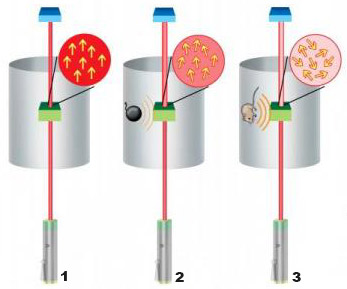New sensors serve medicine and military
US scientists are developing a type of sensor that is smaller than rice grain, has a very high sensitivity, can be widely used in medicine and military.
According to the team's research in Nature Photonics on November 1, this sensor is a portable and inexpensive device to detect changes in magnetic field strength, thereby identifying characteristics. of the object to observe.
" We have created a very sensitive sensitivity ," said John Kitching, head of the magnetic sensor manufacturing project, of the National Institute of Standards and Technology (NIST) of the US Department of Commerce. as tall as a very small energy cell '.
According to the team, the device is capable of detecting small magnetic field modifications up to 70 femtoteslas - equivalent to the intensity of a person's brain in a dreamy state.(1 femtoteslas = 0.000000000000001 Teslas - unit of magnetic field strength).
Because of its small size, it can work for weeks like a battery. This device is 1,000 times more sensitive than NIST's most recent miniature, chip-type sensor.

1. The sensor is ready to operate when illuminated with infrared laser (from left cylinder). The original direction of Rubidium atoms (in red circle). 2. Sensors for detecting explosives. The direction of Rubidium atoms changes due to the effect of the magnetic field (in a dark pink circle). 3. Mouse detection sensor. The direction of Rubidium atoms changes differently in the case of detecting explosives (in a light pink circle ).
This new sensor has an extremely small container, including about 100 billion Rubidium atoms. The team projected infrared lasers through the container and measured the amount of light absorbed by Rubidium atoms. The higher the absorption level, the greater the magnetic field intensity.
Mr. Kitching said the application range of this type of sensor is very wide. It can be used to measure electroencephalography, help detect tumors or monitor brain function. In addition, it is used in war zones to detect bombs and other explosives.
Quang Thinh
- Super Russian military uniform 'accepting' pistol shot at 10 millimeters
- 14 events that change the world military history forever
- Sensors help determine the amount of medicine deep in the water
- Developed ultra-thin, transparent, ultra-accurate pressure sensors
- US military aircraft will have sensors 'see through the weather'
- America takes advantage of Arctic ice to track submarines
- Sensors monitor temperature and humidity around plants
- Mechanical mechanic does not have an armored vehicle
- The health sector prepares to serve the 2006 APEC Summit
- New generation of touch devices
- Sugar sensors help detect and prevent disease
- Shaping medicine to save injured people
 Daily use inventions come from universities
Daily use inventions come from universities Special weight loss device helps prevent appetite
Special weight loss device helps prevent appetite 8 inventors were killed by their own inventions
8 inventors were killed by their own inventions Iran invented a motor car powered by water
Iran invented a motor car powered by water